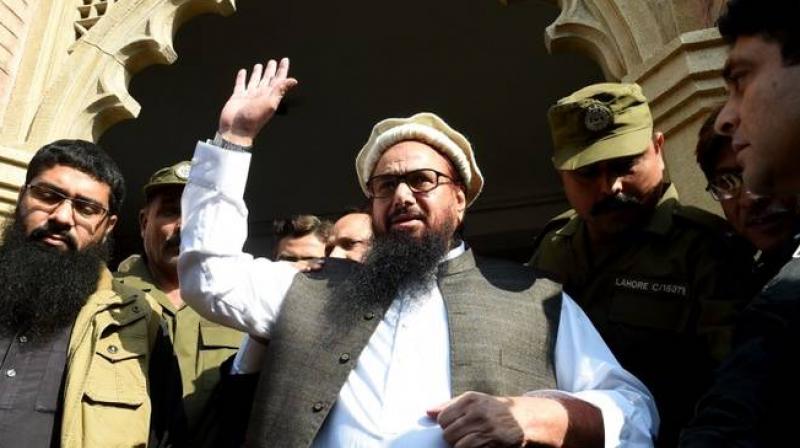Terror tag' threat puts Islamabad under siege

The Financial Action Task Force (FATF), an inter-governmental body comprising 35 nations and two regional organisations (European Union and Gulf Cooperation Council), was set up to “set standards and promote effective implementation of legal, regulatory and operational measures for combating money-laundering, terror financing and other related threats to the integrity of the international financial system”. Initially set up to counter the menace of international money-laundering, it has expanded its scope to incorporate efforts to combat terror financing.
As a major victim of cross-border terrorism and the accompanying scourge of terror financing, India is a member state of the Paris-based secretariat. While FATF findings are in the realm of “recommendations”, it sets the sovereign standards on the required transparencies and measures for handling the terror-financing infrastructure. A definitive outcome of the FATF workings is the dynamic “black” and “gray” list of countries that are designated “non-cooperative” in the global fight against money-laundering and terror financing.
Pakistan was put in the “gray” list in February 2012 and remained there for the next three years. It was taken out from the watchlist only after it showed certain concrete steps to address the issue. In 2015, Pakistan’s then finance minister Ishaq Dar aggressively made a case with corrective initiatives and actions taken to address the twin menace of money-laundering and curbing terror financing. It showcased its intent and will on the matter with the “National Action Plan” – this followed the deadly Peshawar school attack, when the unacknowledged consequences of playing with terror ricocheted on the country. Besides speedy trials, capital punishment and sanctioning military actions against terror organisations, it had sought a clampdown on the sophistry of terror financing, fronts for “terrormonies” and disallowing the chicanery of different names for terror organisations. Over a period of time, the patented Pakistani instinct of a “dual approach”, when it came to the differential slotting of Pakistan facing terror groups (such as Tehrik-e-Taliban Pakistan), as opposed to India facing ones (Hafiz Saeed’s Lashkar-e-Tayyaba or Jamaat-ud-Dawa) or Afghan facing ones (Haqqani Network), set in seamlessly.
The benign charade of allowing terror outfits to merrily change names to avoid official action is the worst kept secret in Pakistan – as when Hafiz Saeed dreaded Lashkar-e-Tayyaba became JuD , and later when the heat increased it got renamed once again, to Tehreek Azadi Jammu and Kashmir! In June 2014, the United States declared Jamaat-ud-Dawa as an affiliate of Lashkar-e-Tayyaba.
Similarly, the group behind the attacks in Uri and Pathankot, Jaish-e-Mohammed, changed its name to Khuddam-ul-Islam! The officially sanctified and overt running of the uber-puritanical seminaries by these groups and the routine fund collection drives have not gone unnoticed. More so, as the Afghan-facing groups, that have received protection and cover from the ISI (like India-facing groups), have directly hit US interests, assets and lives in Afghanistan. As an Afghan diplomat in the US tweeted after the deadly attack that had Pakistani-beneficence written all over it: “The night vision goggles found with Taliban attackers in Maiwand’s ANA base were military-grade goggles (not sold to the public) procured by Pakistan Army from a British company and supplied to the Lashkar-e-Tayyaba in Kashmir and Taliban in Afghanistan. Lashkar-e-Tayyaba is an international terrorist organization.”
The exact same sentiment was echoed by India’s defence minister on the incontrovertible support afforded by Pakistan in the wake of the Sunjwan camp attack: “Definitely evidence will be given, as always, to Pakistan. And yes, Pakistan, in spite of us giving dossiers after dossiers, has not taken any action. On the contrary, we find people who were directly responsible for the Mumbai terror attacks and many others are still free and happily roaming in Pakistan.”
The chorus for punitive action against Islamabad’s deceitfulness is growing internationally, and the United States, Britain, France and Germany have jointly proposed a motion to put Pakistan under a global terror financing watchlist once again. With the impending plenary session of FATF to be held in Paris from February 21 to 23, the humiliating threat of getting blacklisted once more is very real for Pakistan. The ignominy of getting proposed by four countries jointly is unique and a “first-time-ever”. It points towards the gravity of accusations on Pakistan’s patent behaviour.
As expected, Pakistan has been consistently brazen and is trying to pint a finger at New Delhi, accusing it of pulling strings from behind the scenes, even though diplomats at the US embassy in Islamabad have bluntly refuted this by saying “absolutely not”!
While Pakistan is working feverishly with China, the GCC countries, Turkey and even Russia in a bid to muster the numbers against the “gray list” possibilities, its domestic nervousness is displayed by a flurry of political and administrative activities to “complete the few outstanding actions”. Pakistan President Mamnoon Hussain passed a sudden ordinance to amend the Anti-Terrorism Act 1997 which seeks to ban all those individuals or groups that get designated as terrorists by the United Nations. Almost immediately, the action of seizing moveable and immoveable assets of Hafiz Saeed’s ensued, with the government taking over the seminaries, offices and other facilities, besides confiscating donation boxes. The and Falah-e-Insaniat Foundation, which are a “charity” cover for Hafiz Saeed’s LeT, the group behind the 26/11 Mumbai attacks, had earlier led the US to place a $10 million bounty on Hafiz Saeed’s arrest. However, Pakistan had stayed smug and complicit in allowing him a free run. Former Pakistan dictator Pervez Musharraf had infamously called himself the “biggest supporter” of both Hafiz Saeed and his JuD!
But with several countries calling the Pakistani bluff on its terror record, its interior minister Ahsan Iqbal’s recent statement — “no country in the world has made as many sacrifices and as much contribution towards fighting terrorism [as Pakistan] in the last years” — falls short of credibility. The Damocles’ sword hangs over the Pakistani government as the chickens come home to roost over Pakistan’s hypocritical stand on terror.

